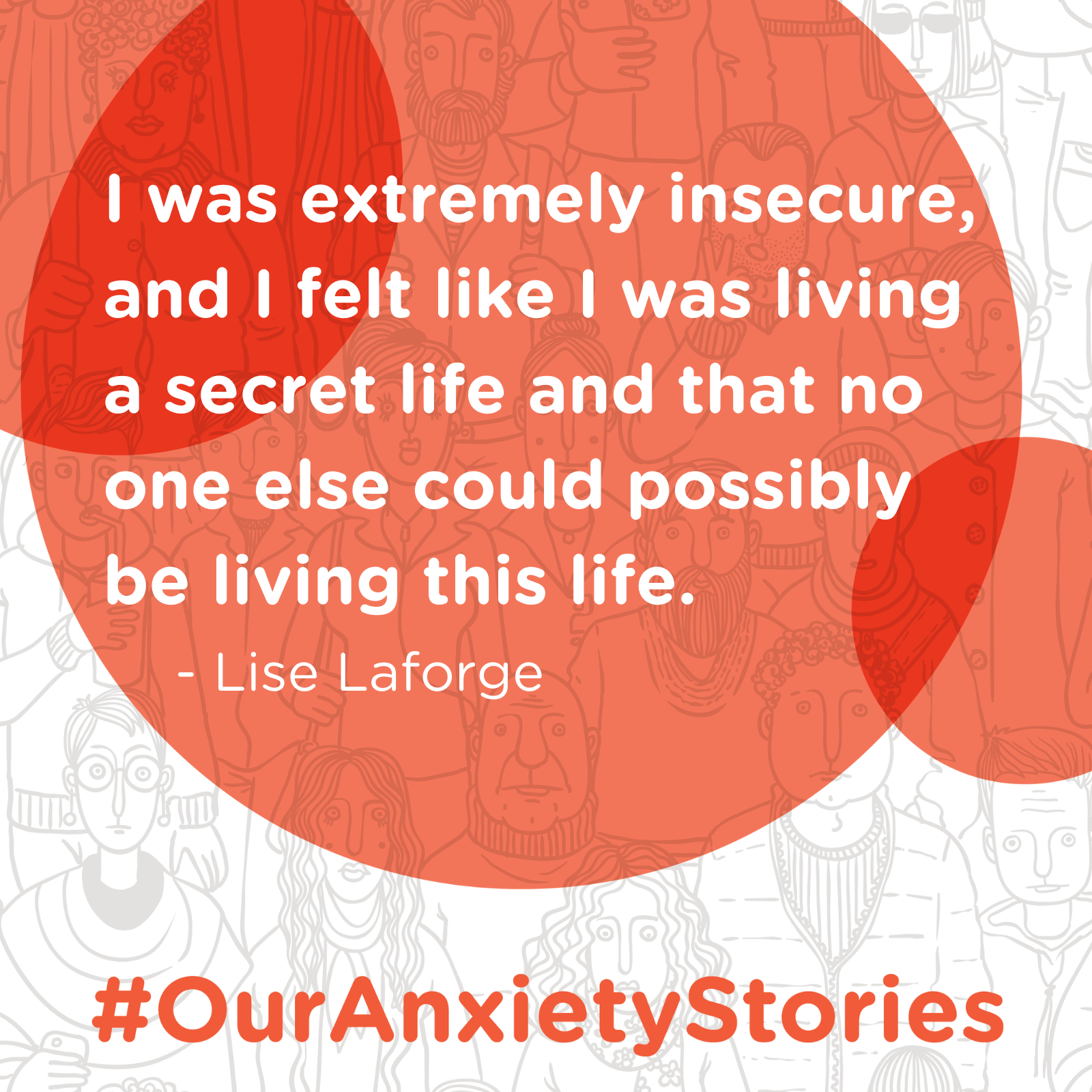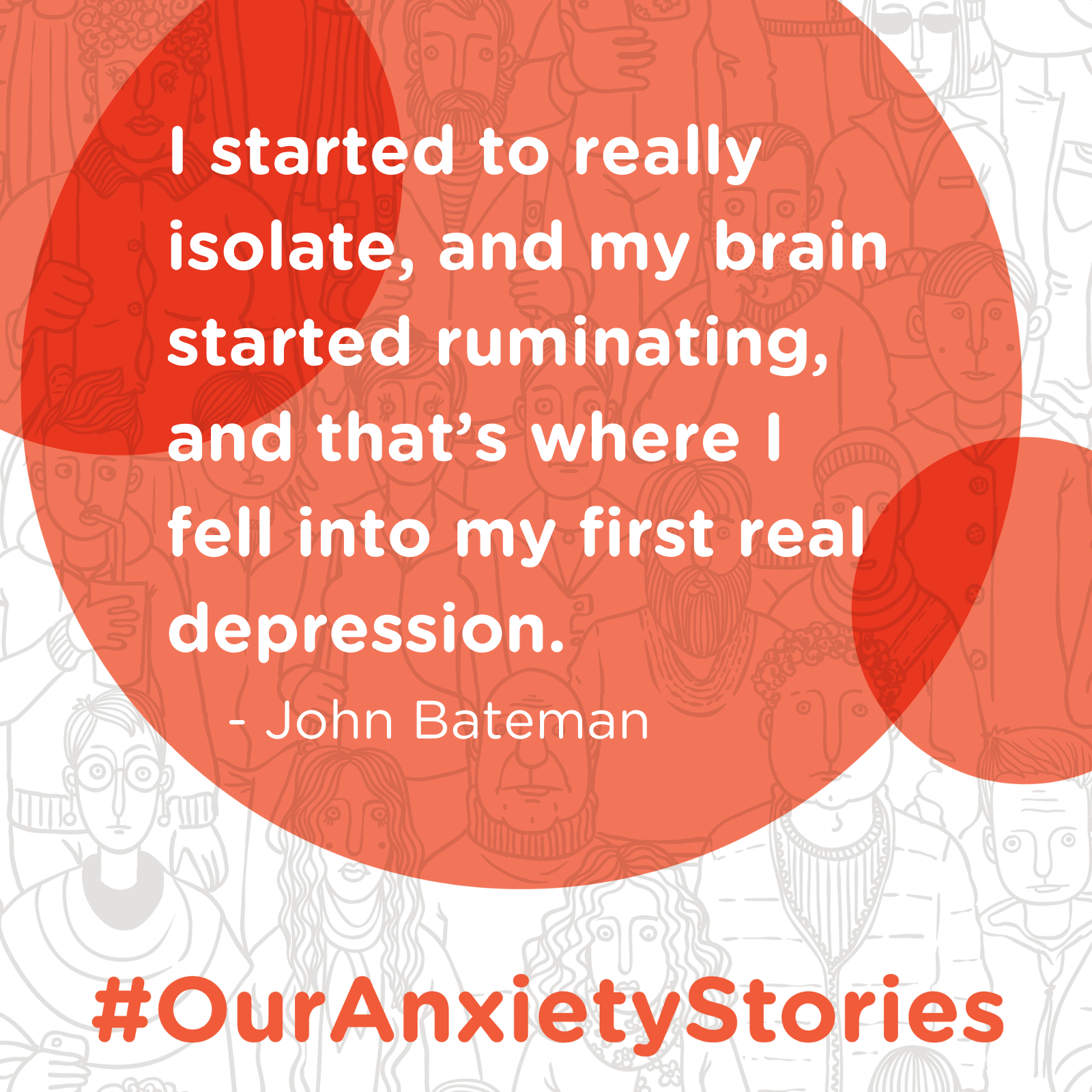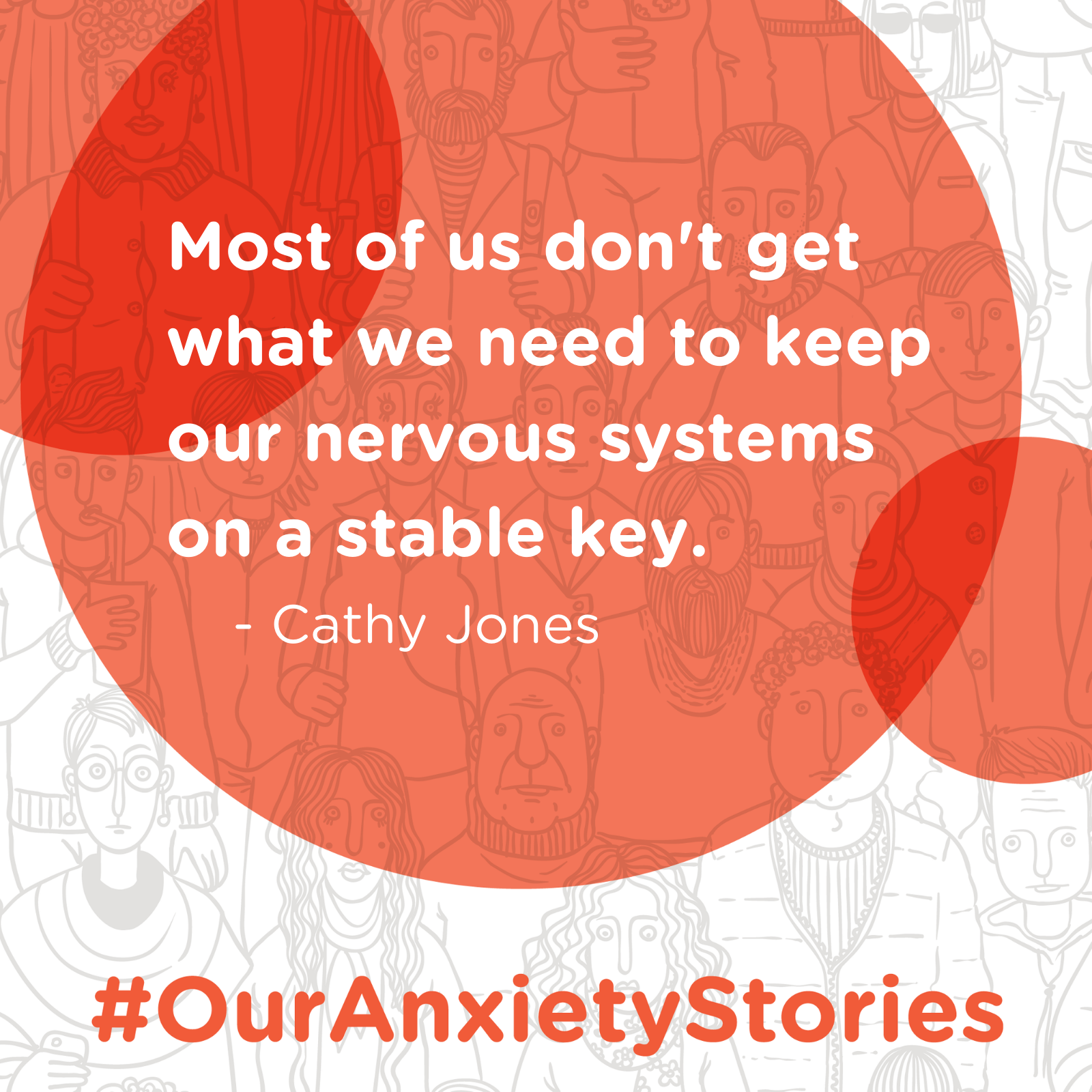Episode Transcript
Speaker 0 00:00 <inaudible>.
Speaker 1 00:08 You are listening to our anxiety stories, the anxiety Canada podcast with Jon Beekman, checkout anxiety, canva.com for more totally free anxiety resources, including our app Mindshift at CBT.
Speaker 0 00:24 Your lawyer, Megan, how are you?
Speaker 2 00:26 I am well John, how are you?
Speaker 3 00:28 I'm doing fine. Thanks. Yeah, I'm hanging in there.
Speaker 2 00:31 Good.
Speaker 3 00:31 Yeah, yeah, I'm doing well. So, uh, again, the, the question I'm leading off with and um, and what I hope you'll answer it, you know, our hashtag is our anxiety stories. So I'm wondering what is your anxiety story, Megan?
Speaker 2 00:45 Sure. Um, I have generalized anxiety disorder, um, as well as um, OCD and uh, I exhibited symptoms at a very young age. Obviously I wasn't diagnosed at a young age. Um, people just thought that I was quite earnest. Um, um, an excessively like an excessive warrior. Um, so at a young age I, I recall having a lot of worries and concern by, for example, I had to see my parents. Um, I had to wave to them from the school bus, um, to someone I was quite young. Otherwise I was convinced something terrible would happen. And if that routine, like if, if both of them weren't there, it would be very upsetting for me. Um, I couldn't do things spontaneously if there were a change in plans, I couldn't just go with the flow. Um, I was constantly worried. People were angry with me or upset with me.
Speaker 2 01:46 I constantly thought reassurance from people and it, it just continued, you know, to a grade school through high school, through university. Um, and at times I, I actually think, and I believe I've heard a few people say this, um, I've, I've heard some of the interviews today, not all of them, but some of them, and I've heard people echo the same sort of comment about actually thinking it, it helps them succeed in a way. And I think it helps me, um, scholastically I was a high achiever and I think in part because anxiety was constantly driving me, unable to stop studying because I could never trust that I knew what I needed to know. Um, I would just drive myself forward and forward and forward. Um, and it wasn't until my second, the second year of law school in the summer, I believe I was referred to a psychiatrist and he told me that I had wall-to-wall anxiety and he wasn't quite sure how I functioned.
Speaker 2 02:51 Um, and I remember that because I remember thinking it was really quite rude and I was offended. Um, but that was the first time, even though intellectually I understood the feeling of anxiety, it was the first time it was applied to me. And it was the first time that I had an appreciation of maybe how unhealthy some of my behaviors were. Um, and so it was a first time I accepted or even heard that maybe my life could be different if I, if I could make some changes and I could get some help, um, that I didn't have to live the way I was living.
Speaker 3 03:30 Yeah. One thing that I'm, uh, that I, when, when you were just talking now that I was a curious about, when you were talking about how you were, um, kind of, I guess you could say you're hiding in your work, um, in, in schoolwork and Scholastic pursuits. Did you experience anxiety physically then even when you were kind of, um, kind of going through what you consider to be, um, obsessive compulsive? Did, were you experiencing, uh, you know, anxiety at that point?
Speaker 2 03:59 Oh yes. I mean, I don't know at my young, at the younger ages that I would have known that's what it was. Um, as opposed to being told I was a nervous Nelly or, um, you know, think things like that or a worrywart, um, or highly sensitive or over sensitive. I got that a lot. Um, but absolutely there were times when I would feel, um, physically ill if I was going to be late for something. Um, it would be physical symptoms that were far surpassed. What one could really account for as maybe the general anxiety that we might get in certain situations in which we're uncomfortable. Um, you know, I, I recall times in university where I would have panic attack and have to sit down on a bench because it felt like I was having a heart attack. Um, so absolutely. I, it was, I had a lot of physical symptoms as well as the, just the general torment and rumination, um, that often accompanies anxiety.
Speaker 3 05:06 Right. So what did your, what did it look like when you decided to get help for this? What, where did you, where did you go? How did you access it and then I guess you're into cognitive behavioral therapy as well? Yes,
Speaker 2 05:20 CBD is really helpful for me. Um, it didn't start off that way. I mean like, like I said, that psychiatrist is the first person to introduce the concept to me. Um, and uh, he prescribed me a medication, uh, and I was naive and at the time I thought it was simple enough. I would take his medication and, and things would be better. Um, and the can't lie. I did feel relief with the medication. I have moments where I, I can remember there being an exam the next day and me sitting on my bed watching a movie and wondering what was wrong with me, why I wasn't studying and the why I was so relaxed. But eventually I, I, um, I wanted to be off that medication. Um, and I sort of fought with the psychiatrist about it and then it went off it and I thought that I could manage this on my own. Um, and I thought his mom is, I was a productive member of society and I was excelling in my job, um, that I was fine and that turned out not to be the case. Um, and so I sought out therapy and, uh, started doing CBT work with, um, a private therapist. Uh, and, and that has proven, um, to be the way to go for me.
Speaker 3 06:43 Yeah. And what aspects of CB of CBT do you use? Like did resonate most with you? Because there's a lot of different tools in the CB CBT toolkit, which ones kind of work best with you?
Speaker 2 06:57 Um, the, I do, um, some exposure work, uh, which is really uncomfortable because it, you know, like amped up your anxiety at the beginning. You have to, you end up basically learning how learning how to sit with that anxiety until you realize that, um, what you're fearing isn't actually going to happen. Um, so that has been helpful. Um, I don't know the name of the technique, but when I have a, um, I'm really great at catastrophizing.
Speaker 3 07:28 Right? Yeah, I'm good at that too.
Speaker 2 07:31 You're good at that too, right? I'm really good at that. So if I have a catastrophic spot or the technique or you write the thought down at the top of the page and then you draw a color or a line down the page and you divided into two and on one side you're supposed to write all the evidence for that catastrophic thought. Right? And of course that would be the part where the anxious mind is brilliant and it can come up with all kinds of evidence and support. And then on the other side, you're supposed to come up with evidence against or, um, something that can counter the argument on the other side of that line. And it's somehow in that process of thinking and writing down, um, the, the evidence against, um, that you, you work your way out, um, of the rumination and the catastrophe that you've allowed to develop in your head. Um, and I also took a CBT, um, mindfulness meditation course here in, in Vancouver. Um, and uh, I also find that if, if I can manage to do some breathing and some square breathing, which is not exactly CBT, but sometimes, sometimes it helps me.
Speaker 3 08:47 Yeah. I've never, I actually haven't heard of a, of something called square breathing. Is it just, that's just a physical kind of method to how you do it?
Speaker 2 08:54 Yeah. So you breathe
Speaker 3 08:56 in for four and you hold your breath for four, you breathe out for four and you hold for four. So then the idea is like, it's four sides, like a square. Um, and it helps activate your parasympathetic nervous system, which then helps calm down the sympathetic nervous system, which is like our, our fight and flight response. Yeah, yeah, yeah. So you have a, what many considered to be a pretty, pretty high pressure job and, uh, you're, you're a prosecutor and, uh, how, I mean, how does, how do you, how does anxiety fit into that? And, uh, how does CB, uh, CBT fit into that?
Speaker 2 09:39 Uh, yeah, it's tricky, right? Because, ah, well because I'm very open about having generalized anxiety disorder, I often feel like I might as well wear a placard for him.
Speaker 3 09:53 Yeah. Yeah. Maybe we should start making those.
Speaker 2 09:59 Hello. My name is and I have GAD.
Speaker 3 10:01 Yeah, exactly. Exactly.
Speaker 2 10:04 Um, so I'm quite open about it at work and, um, so most people know that. Yeah. Um, and the key for me is, is maybe catching myself, um, when it's amping up for me or when I'm engaging in anxious behavior. So it's hard to know because sometimes you, like for example, I write a legal argument. Yeah. And they proofread it, you know, and I proofread it a few times. Well that's normal, but when it's getting to the point where I can't sign the document because I'm, I can't trust that I did that, I proof read and read every word and I feel like I have to start reading that document 10 times before I'll put my signature on it. Um, each time that I go back and reread it and I'm not trusting myself that I just increased my anxiety.
Speaker 3 10:57 Yeah. That's pulling into bit of the OCD, I guess.
Speaker 2 11:00 Yeah, exactly. So there'll be times like that or, um, sometimes I'll be in court and as you know, a judge will say something and I'll get really tripped up on maybe the tone and then afterwards, um, well I'm debriefing to myself or to my colleagues I get fixated on, Oh, or like was that tone where they did they mean something by that?
Speaker 3 11:27 Yeah. Yeah.
Speaker 2 11:29 And so I can get sidetracked by things that other people don't get sidetracked by, or I expressed this to them and they'll be like, Oh, don't worry about it. Or no, don't be silly, but they don't realize that I can just not worry about it.
Speaker 3 11:46 Yeah. That's not, if that was the case, then you wouldn't be in that particularly in the first place.
Speaker 2 11:51 Exactly. Like it, like not like I want to spend the time ruminating on that, but I'm, I'm stuck and I need a way to get out. If it's, if it's like being stuck in an endless cycle and unless it's on how broken, you're just not, you're not going to get out of it.
Speaker 3 12:08 Yeah. So how did you get, uh, how did you kind of get connected to us, you know, through anxiety Canada and get, get onto this show? Like what brought you there?
Speaker 2 12:17 Um, well I had with as most people with anxiety, um, I've had times where things have been under control and times when it hasn't been. Yeah. Um, and the year of 2018 was a very challenging year for me. Um, or maybe I guess maybe 20 years, 2017 into 2018 and I had a, uh, I had a real problem in January of 2018 I ended up having a significant anxiety crisis. Um, and I hadn't had something that bad in a long time and it's, my colleague started noticing it and I just started becoming more open about it. And then I started realizing that I wanted to do something. The, I figured that if I had this lived experience, um, that I could do something positive with it. And I, I started trying to figure out how I could volunteer. And at first it was looking at the Canadian mental health association and I couldn't find, um, that they often had any volunteer opportunities.
Speaker 2 13:24 And I stumbled across this website for anxiety DC. Right. And there were over an email and then I never heard back. Um, and I checked in again and it turned out that they, I guess I weren't using that email anymore or hadn't checked it. And then I was put in touch with Judith law, uh, and I just met her and I just expressed that I really want to volunteer and I really want to help. Um, I want to help de-stigmatize anxiety. I want people to feel able to talk about it. Um, and I would also like to at some point, um, volunteer directly in trying to help other lawyers.
Speaker 3 14:03 Yeah, that's, I think that's, that's great. And we anxiety Canada of course. Certainly appreciate what you do and I certainly appreciate what you've done today by talking to us. So honestly and candidly about your journey through anxiety. It's really important and it's important for people in your discipline and it's important for people everywhere that they hear people from all walks of life talking about what they've been through. And I really appreciate you sharing your story with me, Megan.
Speaker 2 14:28 Well thank you and thank you for having me, John. And I appreciate you doing this even though I know it's making you a little bit anxious.
Speaker 3 14:34 That's right. That's right. I'll breathe. I'll try this. I'll try square breathing. Maybe triangular to start, you know, I'll start slow. Thanks very much man. Okay, you too. Bye. Bye.
Speaker 0 14:46 <inaudible>
Speaker 1 14:50 thanks for listening. Our anxiety stories, the anxiety candidate podcast with John Beekman. Check out anxiety canada.com for more anxiety resources including our app mind-shift CBT. And if you like what you hear, please consider making a donation. This podcast is made possible by listeners like you. Until next time,
Speaker 0 15:08 <inaudible>.


